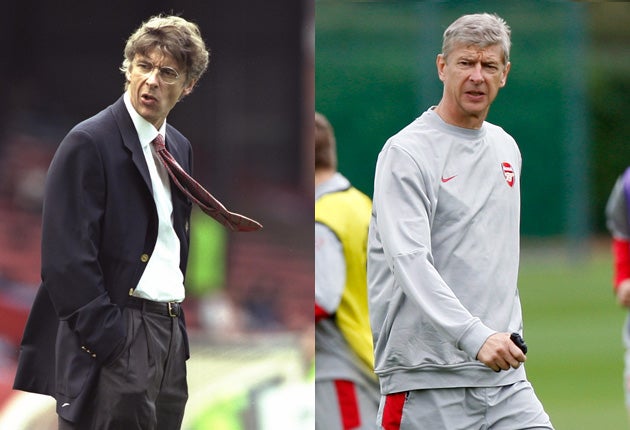Arsène Wenger: 'They were a little bit crazy to give me the job'
After 13 years in charge, Arsène Wenger becomes Arsenal's longest-serving manager this week. Mark Fleming hears his plans to be a hit with fans – and shareholders – for a long time to come

On Thursday Arsène Wenger will mark exactly 13 years in charge of Arsenal, and in the process he will become the longest-serving manager in the history of the club.
Looking back, Wenger admitted yesterday the club were "a little bit crazy" to appoint him in 1996, at a time when foreign managers were considered unlikely to be able to cut the mustard in English football.
Wenger however enters the Arsenal history books during a period in which his decisions are being questioned and his character is being criticised more than at any time in his 13 years at the club.
Arsenal are making more money than ever. Yesterday the club's parent holding company revealed an increase in turnover to £313.3m and a record profit after tax of £35.2m from results for the year ending 31 May. And that is not taking into account the £41m they have received in the summer for the sales of Emmanuel Adebayor and Kolo Touré to Manchester City.
Things however have not been nearly so successful on the pitch. It has been four seasons since Arsenal last won a trophy, the 2005 FA Cup, and they have not been among the early pacesetters in this season's Premier League. Wenger, whose side entertain Olympiakos in the Champions League tonight, accepted that winning trophies is the most important consideration at any club – but not at any cost.
Wenger said: "Success on the pitch is the most important by far, but success on the pitch cannot be maintained if you are in financial trouble. I would not feel that I do my job well if we lost money at the end of the season, no matter what happens on the sporting side, because that way you put your club in trouble and that is something that cannot be accepted from any manager, in my opinion."
The strength of Arsenal's financial situation has yet to have been felt fully in the transfer market, as Wenger has been reluctant to spend the club's profits on expensive recruits. It has become a bone of contention for those supporters frustrated at the team's lack of tangible success since 2005.
Wenger said yesterday he has money if he requires it, but needs to be convinced that any recruits will improve his side. Critics say that policy needs revising, as it has resulted in Arsenal's leanest period of modern times, but Wenger is not a man for changing heart easily.
"It is true there is money and people reproach me for not losing money. It is not a personal thing, it is just that I have a squad that is strong enough to compete. If I buy now, I will not find better players. I will not have a better team. It's not because I'm against spending money, I have nothing against spending money," he said.
English football was a very different place when Wenger, who will be 60 next month, officially started his job at Arsenal on 1 October 1996. The Evening Standard ran the headline "Arsène Who?" to greet his appointment; the man himself was often the object of ridicule and suspicion. Looking back, Wenger is surprised that a club like Arsenal with its strong sense of tradition should have taken such a revolutionary step.
"When I think retrospectively, that is the biggest surprise to me," he said. "Because at that time, what Arsenal did, you needed to be a little bit crazy. Crazy in the sense that I had no name, I was foreign, there was no history. They needed to be, maybe not crazy, but brave.
"I can show some articles where people tried to prove that the foreign managers can never win an English championship. That has changed. There was a history and belief in England that the foreign manager could not be successful. Now you have a different feeling, now you think only foreign managers can be successful. That is wrong as well."
The Champions League is the only major trophy, discounting the Carling Cup, that has eluded Wenger at Arsenal. Progress in this year's competition has not been helped with the news that Arsenal will be without Denilson and Nicklas Bendtner for tonight's visit of Olympiakos in Group H. Wenger broke the news yesterday that midfielder Denilson has a stress fracture in his back and will be out for two months. The 21-year-old, who played more games than any other Arsenal player last season, picked up the injury in the recent 4-2 defeat to Manchester City.
Striker Bendtner is also ruled out after suffering bruising in a car accident in his Aston Martin on Sunday. Wenger said: "Fortunately there was no long-term damage but he is bruised and we thought it best for him not to practise."
Secret life: So you think you know Arsène ?
*Wenger's brother Guy played alongside him in the Duttlenheim FC team that won the Bas-Rhin regional third division title in 1969. Guy was thought to be the better player.
*Picked for the French university team when he was studying at Strasbourg, Wenger toured Nigeria, Lebanon and Uruguay as a student in the 1970s.
*Despite his limitations as a player, he was part of the Strasbourg squad that won the club's only French championship in 1979.
*His favourite card game is écarté, which means 'discarded' in French, a reference to the fact that all cards from two to six are omitted at the start. Legend has it the game was invented by Napoleon Bonaparte.
Join our commenting forum
Join thought-provoking conversations, follow other Independent readers and see their replies
Comments
Bookmark popover
Removed from bookmarks